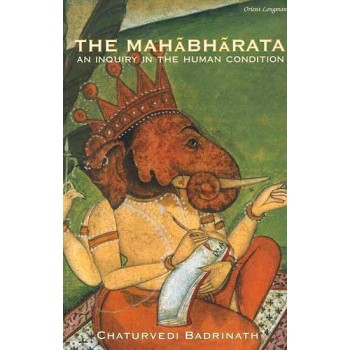The Mahabharata An Inquiry in the Human Condition
| Price: | Rs.395.00 |
Detail Of The Mahabharata An Inquiry in the Human Condition
| ISBN | 9788125032380 |
| Pages | 700 |
| Language: | English |
| Product Code: | 1 |
| Size(in cm): | 9.3" X 6.2" cm |
| Weight(in grams): | 1000(approx) |
Description:
CONTENTS
Acknowledgements ix
A Note on the Diacritical Marks and Translations xiii
Dramatis Personae of the Mahabharata xv
The Eighteen Main Parva-s of the Mahabharata xvii
Chapter 1. Introduction to the Mahabharata 1
The subjects of the inquiry and their universality 3
The method in the inquiry 10
Chapter 2. Food, Water and life 23
Food and water in the Upanishad-s 24
Food and water in the Mahabharata 30
Giving and sharing not ritual 'acts' 35
The always-full cooking pot 37
A portion for the unknown guest 39
Chapter 3. The Spiritual and the Material in the Mahabharata 41
Perceptions of the Self 57
Radical shift in the Mahabharata 67
Self, energy, and relationships 70
Chapter 3. Dharma ? The Foundation of Life and Relationships 77
The radical shift in the Mahabharata the universality of dharma 85
Dharma and the question of relativism 90
Another radical shift in the Mahabharata 95
Dharma as relationship of the self with the self and with the other 101
Chapter 5. Ahimsa ? Not ? violence, the Foundation of Life 113
Not-violence: The foundation of life of and relationships 115
The opposite reality: 'Life lives upon life' 119
The rationality of not-violence 123
Justification of anger on being wronged 127
The rationality of forgiveness and its limits 142
The argument against enmity and war 148
Violence in speech and words 154
Violence to one's Self 161
Freedom from fear: freedom from the violence of history 163
Chapter 6. What is 'Death'? The Origin of Mrityu 169
Chapter 7. The Question of Truth 181
Truth and the problem of relativism 183
Truth is relational 192
Chapter 8. Human Attributes ? Neither Neglect, nor Idolatry 199
Svartha and niti, self-interest and prudence 216
Chapter 9. Human Attributes ? Sukha and Duhkha : Please and Pain 225
'Pleasure' and 'pain': experienced facts 227
The reasons why there is more pain than pleasure 231
'Perhaps that is why you look pale and weak'? The psychosomatic link 239
From the same facts: three different paths to happiness 246
A radical shift in the 'because-therefore' reasoning 260
The Mahabharata's teachings of happiness 263
Chapter 10. Material Prosperity and Wealth, Artha 271
Importance of wealth in the Mahabharata 273
The other truth concerning wealth 280
Chapter 11. Sexual Energy and Relationship, Kama and Saha-dharma 295
Conflicting attitudes towards woman 304
Comparative pleasure of man and woman 312
The question regarding the primacy of sexuality 313
Sexuality and relationship in the Mahabharata 317
Possession of the mind 327
Kama subject to dharma 331
Chapter 12. Grihastha and grihini, the householder; Grihastha-ashrama, life-in-family 335
Family as a stage in life 340
. The highest place for the householder and the family 347
Obligation and duties, and 'the three debts' 350
Not obligation and duties alone, also feelings 351
The place of the wife in the life-in-family 354
The place of the mother in the life-in-family 360
Conversations between husband and wife as part of family life 365
Life-in-family in the larger context of life 367
Chapter 13. Varna-dharma, Social Arrangements; Loka-samgraha, towards Social Wealth 369
The origin of varna 372
Varna ? a function, not a person 375
By conduct, not by birth 375
By birth, not by conduct alone 379
The humbling of arrogance 386
Antagonism among social function: its psychology 394
Harmony among social callings: the way to social wealth 410
Chapter 14. Dharma ? The Foundation of Raja-Dharma, Law and Governance 417
The purpose of governance, danda 422
The main attribute of governance 428
Self-discipline of the king 430
Impartiality, truth, and trust in governance 435
Trust as the foundation of republics 440
Public wealth under the control of dharma 441
Fear as the basis of the social order 444
Reconciliation or force? 448
The law of abnormal times: apad-dharma 453
An argument against capital punishment 455
The king crates historical conditions, not they him 458
Chapter 15. Sage Narada's Questions to King Yudhishthira 465
Concerning Yudhishthira's relation with his self 466
Concerning the principles of sound statecraft 468
Concerning the principles of sound administration 470
Questions concerning the security of the realm 474
Above all, questions concerning the foundations of good governance 475
Chapter 16. Fate or Human Endeavour? The Questions of Causality 477
Daiva, fate 479
Purushartha: human endeavour 483
Endeavour and providence together 487
Kala, Time 491
Svabhava, innate disposition 503
The Question of accountability in what happens 508
The Question of causality unresolved 523
Beyond 'causality' 527
Chapter 17. From Ritual Acts to Relationships 529
What is true shaucha, 'purity'? 530
What is true tirthas, pilgrimage? 534
What is true tyaga, 'renunciation'? 539
What is sadachara, 'good conduct'? What is shishtachara, 'cultured conduct'? 547
Who is truly a pandita, 'wise'? Who is a fool? 552
Who is truly a santa, 'saint'? 556
Chapter 18. Moksha ? Liberation from the Human Condition 559
The rationality of moksha 560
The radical shift in the Mahabharata 567
The attributes of a free person 570
Moksha as freedom from 577
The paths to moksha 580
Moksha as freedom into 588
Notes 593
Index and Concordance 631
Reviews (0)
Write a review
Your Name:Your Review:
Note: HTML is not translated!
Rating: Bad Good
Enter the code in the box below:



 |
| 